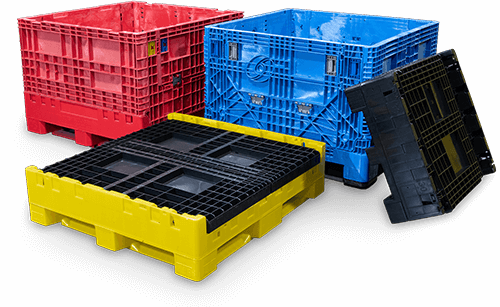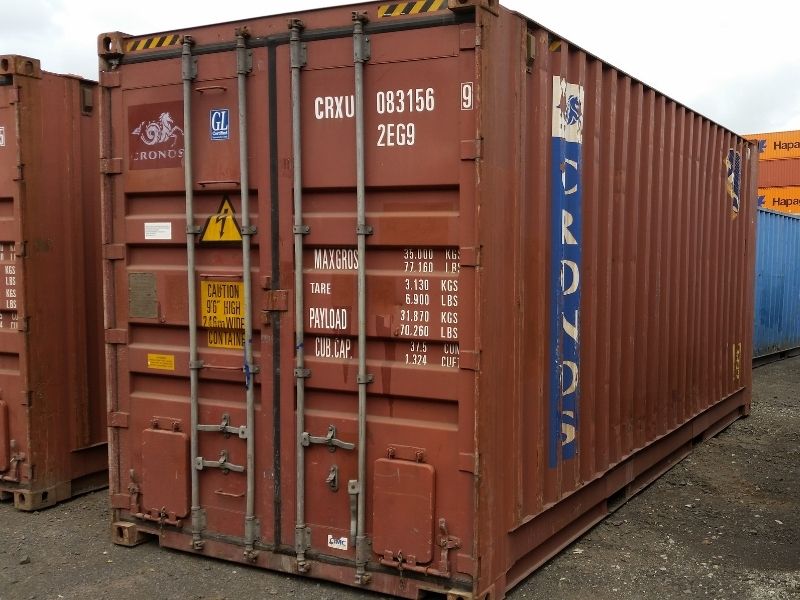Top reasons to choose used bulk containers for sustainable business operations
Wiki Article
Why Bulk Containers Are Important for Sustainable and Affordable Transport
Bulk containers play a crucial role in contemporary logistics. They help with the effective activity of huge quantities of products, therefore optimizing transportation processes. This approach not just minimizes costs however also reduces environmental effect via reduced exhausts and waste generation. As markets seek even more sustainable techniques, the fostering of bulk containers is coming to be increasingly substantial. What implications does this change hold for future logistics and supply chain management?The Benefits of Using Mass Containers in Logistics
Mass containers reinvent logistics by boosting efficiency and sustainability. These containers permit the transport of large quantities of items in a single journey, considerably reducing the variety of trips needed. This not just simplifies procedures however also lessens labor costs connected with handling, packing, and discharging. Furthermore, mass containers are designed to enhance area utilization within transportation lorries, ensuring that even more products can be shipped simultaneously.The standardization of mass containers also streamlines the logistics procedure. With uniform measurements, they can be easily stacked and kept, bring about improved storehouse monitoring. Moreover, bulk containers usually feature resilient products that protect components from damage throughout transportation, therefore decreasing item loss and raising overall integrity. Because of this, companies can experience boosted supply chain efficiency, eventually causing raised earnings and customer complete satisfaction. This mix of aspects makes bulk containers an essential property in contemporary logistics.
Ecological Influence: Lowering Waste and Carbon Footprint
As industries significantly focus on sustainability, the adoption of mass containers has become a crucial approach for lowering waste and lowering carbon footprints. These containers reduce making use of product packaging products, such as boxes and plastic, therefore significantly decreasing overall waste generation. By settling deliveries, mass containers enhance transportation effectiveness, permitting more items to be transported per journey. This reduction in trips directly correlates with lower greenhouse gas emissions, adding to a smaller carbon impact.Mass containers can frequently be reused or reused, even more mitigating environmental effect. The sturdiness of these containers warranties they can hold up against multiple transportation cycles, minimizing the demand for single-use alternatives. refurbished bulk containers. By enhancing logistics and promoting reliable source usage, bulk containers not only sustain sustainable methods but likewise urge sectors to straighten with international environmental objectives. Eventually, their execution mirrors a commitment to ecological stewardship and responsible resource administration
Cost Financial Savings: Exactly How Mass Containers Lower Transportation Expenditures
While numerous business look for means to enhance their profits, making use of mass containers presents a considerable possibility for lowering transport expenditures. Mass containers make the most of the quantity of products transported, allowing services to deliver bigger amounts at once. This performance minimizes the number of journeys needed, directly lowering fuel expenses and decreasing labor expenses linked with loading and dumping.In addition, mass containers frequently feature structured designs that optimize room use within transportation automobiles. This means fewer empty spaces, bring about extra reliable use readily available capacity. The durability of bulk containers can reduce the danger of item damage throughout transportation, guaranteeing and reducing losses that even more items show up intact.
Enhancing Supply Chain Effectiveness With Bulk Storage Solutions
Mass storage services play an essential duty in boosting supply chain efficiency by maximizing inventory monitoring. By combining products into fewer, bigger containers, organizations can considerably minimize taking care of expenses connected with regular transfers and processing. This streamlined method permits for much better tracking and management of supply, ultimately resulting in improved operational performance.Streamlined Inventory Management
Effective supply administration is crucial for enhancing supply chain procedures, especially when organizations take on bulk storage space services. These options make it possible for companies to keep higher stock degrees while reducing the frequency of replenishment. By consolidating products right into bulk containers, companies can streamline their supply processes, decreasing the complexity related to tracking numerous smaller plans. This method promotes accurate stock matters and boosts projecting accuracy, enabling for more informed decision-making. Furthermore, mass storage services simplify storage facility organization, making it much easier to find and accessibility products when required. Consequently, companies can accomplish a more reliable supply turnover rate, ultimately improving total supply chain performance and reducing the probability of stockouts or overstock scenarios.
Minimized Handling Costs
The execution of mass storage space solutions not only improves supply administration however additionally considerably decreases dealing with costs throughout the supply chain. By consolidating products into mass containers, companies decrease the need for frequent handling and transfer in between different storage and transport devices. This method cuts down on labor prices related to loading, discharging, and moving smaller sized packages. Additionally, bulk storage reduces the regularity of deliveries, resulting in reduced transportation expenses More about the author and reduced gas intake. Therefore, organizations can maximize their logistics operations, permitting a much more effective allowance of resources. Eventually, minimized handling costs add to improved total supply chain performance, fostering an environment that supports both sustainability and economic stability.
Adaptability of Mass Containers Throughout Various Industries
Although several industries have distinct demands for transportation and storage space, mass containers have become a versatile remedy that meets a wide variety of requirements. These containers, ranging from big bins to specialized containers, can accommodate diverse materials, consisting of liquids, powders, and granules. In the agricultural market, mass containers help with the transport of grains and fertilizers, while the food and drink sector utilizes them for components and finished products. The chemical sector counts on bulk containers for safely moving unsafe products, making certain conformity with safety laws. In addition, building companies benefit from bulk containers for moving accumulations and various other materials. Their flexibility includes different modes of transportation, consisting of trains, trucks, and ships, boosting logistical effectiveness. This flexibility not just simplifies operations across various industries but likewise promotes sustainability by reducing product packaging waste and optimizing space in transportation. Consequently, bulk containers play an essential duty in modern-day supply chain administration.Future Patterns in Bulk Container Usage and Sustainability
The future of mass container use is increasingly shaped by cutting-edge materials advancement that improves sustainability. In addition, automation in logistics guarantees to streamline operations, reducing waste and enhancing performance. Accepting round economy techniques will certainly further reinvent how bulk containers are made, made use of, and recycled, promoting a more sustainable transportation landscape.Cutting-edge Materials Development
As markets increasingly focus on sustainability, cutting-edge products development in mass containers becomes a substantial consider enhancing eco-friendly transportation remedies. Researchers and producers are checking out eco-friendly plastics, recycled composites, and light-weight steels to reduce ecological effect. These products not just reduce waste however additionally enhance fuel efficiency by decreasing the general weight of containers. Additionally, improvements in clever products, which can adapt to varying conditions, enhance the toughness and capability of bulk containers. The assimilation of these ingenious products aligns with circular economic climate principles, advertising reuse and recycling. As the need for lasting practices expands, the development of such materials will certainly play an essential role in shaping the future of mass container use in logistics and transport.Automation in Logistics
Considerable advancements in automation are positioned to transform logistics and the use of mass containers, boosting sustainability in transportation. Automated systems, consisting of drones and self-governing cars, are enhancing official source the movement of mass containers, decreasing the reliance on traditional fuel-powered transport. These modern technologies enhance routing and loading processes, decreasing vacant miles and enhancing gas go effectiveness. Furthermore, automated supply monitoring systems enhance monitoring and tracking of mass containers, guaranteeing much better resource allotment and decreased waste. The assimilation of the Internet of Things (IoT) allows real-time data evaluation, enabling positive decision-making that aligns with sustainability objectives. As automation remains to evolve, it is anticipated to drive further advancements wholesale container use, ultimately supporting even more lasting logistics methods and reducing the ecological impact of transportation.Circular Economic Climate Practices
Innovations in automation are setting the phase for a much more integrated method to circular economic situation practices in the domain name of mass container usage. As markets increasingly accept sustainability, mass containers are being developed for longevity and reusability. This change not only minimizes waste however additionally boosts resource efficiency. Business are taking on techniques such as closed-loop systems, where made use of containers are collected, reconditioned, and reestablished right into the supply chain. Furthermore, wise innovations track container life cycles, promoting far better administration and minimizing ecological influence. The partnership in between makers, logistics carriers, and end-users is necessary in developing standards for sustainable container use. used collapsible bulk containers. Future trends suggest a growing emphasis on materials that are biodegradable and recyclable, more enhancing the circular economy's principles wholesale transportation
Frequently Asked Concerns
What Products Are Bulk Containers Generally Made From?
Mass containers are usually built from durable products such as high-density polyethylene, light weight aluminum, steel, and cardboard. These materials provide adaptability, stamina, and defense, making them ideal for delivering different items in different sectors efficiently.Just how Do I Pick the Right Size Mass Container?
Picking the right size bulk container entails assessing the volume of materials to be carried, considering managing tools compatibility, and assessing storage space demands. Appropriate dimension guarantees effectiveness in transportation and lessens waste throughout shipment.Are Mass Containers Reusable or Recyclable?
Bulk containers are usually multiple-use, made for multiple trips, enhancing sustainability. Many can additionally be recycled, depending on the materials used. Picking recyclable options additionally lowers and sustains ecological goals waste in transport techniques.What Security Laws Apply to Mass Container Transportation?
Safety and security policies for mass container transport consist of conformity with the Department of Transport standards, correct labeling of hazardous products, structural honesty evaluations, and adherence to weight limits to ensure secure handling and protect against accidents during transportation.How Can Services Transition to Utilizing Mass Containers Properly?
Services can change to bulk containers by evaluating current logistics, training personnel on handling, purchasing suitable tools, maximizing stock management, and teaming up with suppliers to guarantee compatibility and efficiency throughout the supply chain.
As markets significantly prioritize sustainability, the fostering of bulk containers has actually emerged as a vital method for minimizing waste and reducing carbon footprints. By combining products into bulk containers, firms can enhance their stock procedures, reducing the complexity linked with tracking several smaller bundles. As markets significantly focus on sustainability, innovative products development in mass containers emerges as a substantial factor in enhancing environment-friendly transport remedies. Automated systems, consisting of drones and self-governing vehicles, are enhancing the motion of mass containers, minimizing the dependence on standard fuel-powered transportation. Additionally, automated supply monitoring systems boost tracking and tracking of bulk containers, making sure better source allotment and reduced waste.
Report this wiki page